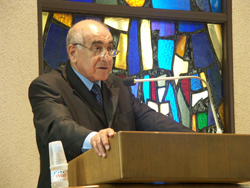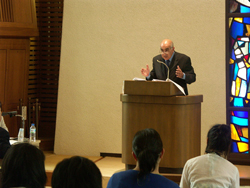Center for Interdisciplinary Study of Monotheistic Religions(CISMOR)Doshisha University
> Public Lectures > Interfaith Dialogue in the Middle EastPublic Lectures
Lecture (Open for the public)
Interfaith Dialogue in the Middle East
| Date: |
2005/05/19 |
|---|---|
| Place: | Chapel in the Divinity Hall, Imadegawa Campus, Doshisha Univ. |
| Lecture: | Hasan Abu Nimah (Director of the Royal Institute for Inter-Faith Studies in Amman,and Jordan's Former Ambassador to the U.N.) |
|
Ambassador Abu Nimah discussed the work of the Royal Institute for Inter-Faith Studies in Amman, Jordan, of which he is the director, against the backdrop of events in the Middle East. Two main themes were developed in the lecture. For one, Mr. Abu Nimah discussed the deterioration of inter-group tolerance in the context of political conflicts and the dominance of autocratic governments among Islamic countries, as well as the historical and social injustice at the root of the Israel-Palestine conflict. In turn, the twofold challenge and task of interfaith work in the region was illustrated in light of misapprehensions about the role of religion in the broader regional crisis. The declining populations of Arab Christians in recent decades presents a microcosm and case study for measuring the social impact of the region-wide crisis, as well as the challenges it creates for religious coexistence. Difficult and perplexing daily conditions can lead people, irrespective of religious affiliation, either to seek better lives elsewhere when possible, or to retreat within the sectarian sphere in search of the security and meaning not provided by political and other secular institutions. To understand this broader situation, three historical sources of present Middle Eastern dynamics were sketched. Mr. Abu Nimah first pointed to the 1979 Islamic Revolution in Iran and the subsequent war between Iran and Iraq. Shiite ascendance in this period led to an increased emphasis on differences between the two branches of Islam, and witnessed the accentuation of martyrdom as an avenue to paradise in order to motivate self-sacrifice in the name of religion. A second factor was the rise of armed resistance movements in response to Israel’s 1982 incursion into Lebanon and its policies of occupying and building on Palestinian lands. Coinciding with these developments, thirdly, is the phenomenon of suicide bombings. Mr. Abu Nimah insisted that these should be seen as a response to occupation and injustice, even as they remain anathema to the spirit and the letter of Islamic teaching. Exacerbating these historical factors is the dominance of autocratic regimes in several Middle Eastern countries, which effectively disenfranchise citizens and thwart popular aspirations. Most recently there has also been the disastrous impact of the September 11, 2001 attacks in the United States. Together, these factors have had the effect of bolstering a Western perception of Islam and Arab civilization as inherently violent, an image unduly stressed in the 'clash of civilizations' model of Samuel Huntington (but originally tendered by Bernard Lewis). Mr. Abu Nimah pointed out how religion has thus been opportunistically pushed to the foreground as the prime catalyst of regional conflict; it becomes a smokescreen, masking the reality of the various forms of social injustice previously mentioned while demonizing human responses to injustice which are not ipso facto religiously motivated, and legitimizing policies detrimental to regional security and to religious understanding. The social impact of today’s conflicts in the Middle East feeds the regional interfaith crisis. From his past experience as a Muslim youth in mixed Muslim-Christian-Jewish environments, Mr. Abu Nimah reflected on both the benefits and the limitations of religious 'tolerance.' Interfaith dialogue as promoted by RIIFS and its founders recognizes these limitations, he asserted. It takes the approach that a future of real acceptance and coexistence begins with at least two coordinated efforts. One must be educating the youth toward a more nuanced understanding of diverse religions, with stress on the broadly shared human experience of religious faith. The other is the work of clarifying the status of religion in contemporary conflicts by focusing on issues of justice, while widely disseminating knowledge of the contributions of minority religions to the dominant culture. These efforts aim at creating the social conditions that enshrine respect of other religions and religious communities. Victor A. Faessel (CISMOR Assistant Editor) |
|
|
Handout |
|

